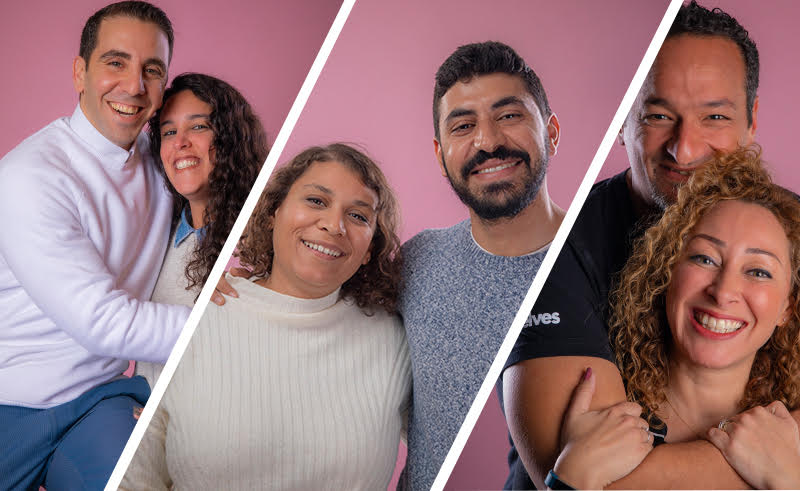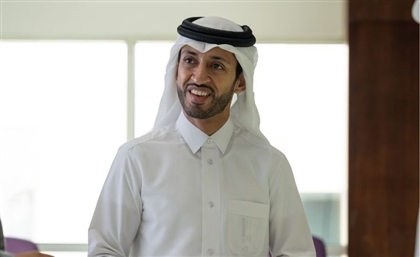On Valentine’s Day, We Ask 3 Couple Co-Founders What It’s Like Working With Their Partners
Love is in the air, who do we pitch it to?

Because love is more than just a game for two, some of the ecosystem’s fiercest entrepreneurs chose the risky path of not only sharing their businesses, but their entire lives – personal and professional.
Imagine being with your spouse almost 24/7; having breakfast, walking down the aisle of your company and getting stuck in meetings together, while turning date nights into brainstorming sessions.
We brought in three couple co-founders behind the leading startups: CottonBall, Elves App, and Kiliim. With more than a decade together, with the exception of the Kiliim couple who have only been together for nine years, the three duos tell us the stories of how they met, how they came up with their startup ideas, how they brought them to life, and how it’s working out so far.
Zena Sallam and Ahmed Habib // CottonBall 
Once upon a sunny day in summer 2006, 25-year-old Ahmed Habib walked up towards 23-year-old Zena Sallam and introduced himself. Zena remembers this day very well; “We were in Soma Bay for a wedding, and I was sitting by the beach with a friend of mine and he knew my friend so she introduced us,” she tells Startup Scene. “He was trying to be all macho and stuff, saying “I’ll remember your name if you leave an impression,” or something cheesy like that. So, I was like whatever.”
Their paths never crossed, not even in the wedding both of them were attending; not until two months later. “We saw each other at this party and it upset me a little bit of that comment a couple of months earlier. Because, leave an impression? Of course, I would leave an impression! And so, I asked him: Do you remember my name?” And he didn’t. Ahmed tells us his friend came to his rescue and whispered Zena’s name in his ear to remind him. “So, what he actually said was absolute nonsense, he doesn’t even remember his good friends’ names let alone my mine.” They spent the entire night together, and despite the awkwardness, it was apparent that their fates would eventually combine. Two years later, they were tied the knot, and five years in their marriage, they started working side-by-side as co-founders at CottonBall, a homegrown cotton fashion label.
The couple was always fond of plain cotton t-shirts and blouses, and had such a hard time buying them in Cairo. In the summer of 2011, they travelled to States, and walked into American Apparel to buy some clothes. “We were telling each other how it’s ridiculous it was that we don’t have an EgyptianApparel when we live in basically the home of cotton. So, CottonBall was born out of that,” Zena says.
“In terms of supply and value chain development, Egypt is very low on the value chain, they’re always operating and manufacturing on the expenses of the value chain,” says Ahmed. “We’re very big in the apparel industry and yet out of the apparel that’s produced in Egypt and sold abroad for $50 to $100 per item, the actual amount of money that enters our country is 10 percent of that tops.”
With all that in mind, all they wanted at this point was to build an Egyptian company, take it abroad, and bring back that foreign income into the country. Back from the U.S., to revolutionary Cairo, Zena and Ahmed got caught up in the heated events spurring in Tahrir Square. When things calmed down, they got in touch with a company that could manufacture their products and they decided to give it a go.
“We found that everyone finds a type of t-shirt or a cut of a t-shirt they like at a place where they can buy it from and consistently go there, so we thought what if we provided people with several cuts at one spot and then they can always come back and get it from the same place.” They started off with three cuts for the men and four cuts for the women and the couple just went out and put their line in a suitcase, going around in survey-visits at their friends’ houses. It was two years after survey-visits and open-days and events that CottonBall opened its first store in Zamalek.
“We’re expanding in different product lines, but within the same Egyptian cotton umbrella,” Ahmed says. By Q3, the CottonBall couple co-founder should have some news for the public about not only their horizontal expansion but also vertical.
“We split roles very clearly,” says Ahmed. “We are very opposite personalities, so we’re very clear about not meddling in each other’s roles,” Zena finishes Ahmed’s sentence. As the Chief Creative Officer, Zena is at the creative marketing and design side of things, while Ahmed, the CEO, handles the operations, technicalities, business development, and finances.
However, there are still moments where they secretly wished they weren’t together at work; “When Ahmed has meetings that run over two hours. Literally, he can have 17-hour meetings,” she complains. “Or when he’s on the phone; he can talk a person’s head off. It’s cute, but I don’t want to be present during that phone call – at all.”
To Ahmed, it’s usually when both of them lose their temperature at one another, and leave this anger episode on display before the entire office. “It’s a red line; fighting, slamming doors, yelling in front of staff is not very acceptable by my terms. But sometimes it happens. It happened two or three times until now.”
Abeer El-Sisi and Karim El-Sahi // Elves App 
At 18, Kareem asked 16-year-old Abeer out. Even though their first date was 21 years ago, the college sweethearts remember like it was yesterday. “My parents had this club they go to and they let me take her there,” Karim tells Startup Scene. “It was very romantic, he picked me up, my friends dressed me up for my first date. It was very cute. But I was very nervous, so I was eating and all so anxious about everything.”
Shortly after both have graduated, they put a ring on it, started a family, and several years later, they launched their “Elves App”; a personal-assistant-hailing app, based between Egypt and the United States.
Splitting roles comes by very naturally between these couple co-founders. “I’m good at the people’s part, he’s good at the business development part,” says Abeer.
“Elves is a human-machine hybrid,” says Karim. “I handle the machine, she handles the human. I make sure we have money to do it and she makes sure we have people and they understand what they’re doing. She looks at the users as people, and not just numbers and data. She’s perfect for it.”
Elves is not the only company they manage side-by-side; it’s in fact their third company. “We started the first one before we were even married,” says Karim. “Then, we had to work in corporate for a while, America is not easy, you don’t have parents living close by and almost always at your service.”
In 2005, they started a second company called E Group, incorporated in Boston, Massachusetts and based in Cairo, operating some of the most sophisticated contact centre operations in the North African region. “That’s the one that grew pretty big and took a lot of years out of us,” Karim says. Elves App’s couple co-founders started in Boston, but resettled everything in Los Angeles. With two boys, Karim and Abeer decided to go back home in 2008, especially that E Group started picking up little by little, building a team in Egypt required them to be present most of the time.
With E Group’s success, the serial entrepreneurs launched Elves App in 2017, which slowly started introducing them to the Egyptian audience after establishing its business model to the American users first. Now they’re back in the States and are travelling back and forth to manage their startups.
“E Group had no Egyptian customers, it was all the U.S,” says Karim. “So, we never had Egyptian customers until Elves. In its first year, we didn’t have marketing campaigns for the app yet, so we let it grow organically until Egyptians occupied about 40 percent of our users.” Working with both calibers, Karim found that the Egyptian users are more forgiving than their American counterparts.
Noha El Taher and Ibrahim Shams El-Din // Kiliim 
Nine years ago, Ibrahim and Noha were together at Model United Nations (MUN), a popular student activity simulating the councils of the real-life UN. He asked her out and they’ve been together ever since. Little did they know that they’ll have a baby girl, Lina, who would spark a business idea between them.
“It all started when we were preparing our baby girl’s bedroom,” Noha tells Startup Scene. They wanted to place a rug at the center of their daughter’s room, and were shocked that nobody was selling well-designed kilim; a flat tapestry-woven rug derived from cultures of the former Persian Empire, Iran, Azerbaijan and Turkic countries of Central Asia.
“The artisans have stopped practicing this craft,” Ibrahim tells us. “We thought why not work on breathing life into this dying industry?” This got them to launch “Kiliim” startup that revived and sustained the ancient craft and its artisans in Fowa, a small town in the Egyptian Delta that is known to master at this industry.
“The biggest challenge was trying to get the craftsmen to practice consistency,” says Noha. “What they were used to doing was just freestyling the whole process. They would just make up a design as they go and our business model demanded more consistency."
Like the other two couple co-founders, Noha and Ibrahim split their roles in Kiliim according to their professional and academic backgrounds: Ibrahim manages the business and financial side of things and anything creative and designs is Noha’s.
In the beginning, the couple used to work at their house. “One of the perks of working together at home was that we’re both there to raise our daughter without having either of us held back at a 9-to-5 job,” Ibrahim says.
However, that perk came with challenges. “It was really tricky for us to draw lines. It was a mess. Kilim carpets stored under the dining table, Lina crawling around them, with both of us trying to work in the background,” Noha remembers.
“That’s the cost you pay when you scale,” says Ibrahim. “As you grow, you get a team and you need to be there to both guide and monitor them. Step by step, we got ourselves a warehouse, so one of us had to commit and attend to it.”
Trending This Month
-
Feb 02, 2026






















